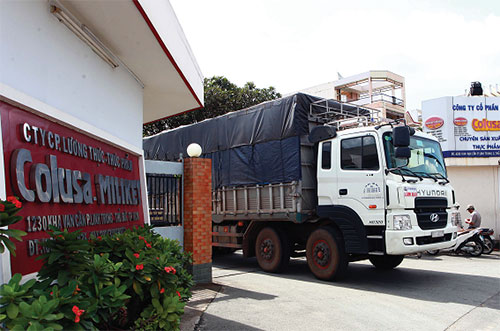Miliket: Instant noodle empire in hot water
 |
Last year, Colusa-Miliket Foodstuff Joint Stock Company, a member of state-owned Southern Food Corporation and owner of the Miliket brand, raked in VND478 billion ($21.8 million) in net revenue, down 2 per cent on-year, and more than VND31 billion ($1.4 million) in after-tax profits, a 50 per cent jump on-year.
This sharp growth in profit, however, stemmed from falling ingredient prices and the application of strong cost-cutting measures, and the company’s recent financial statement bemoans chronic inefficiency in its sales activities.
Other figures related to production output and revenue have all sunk, casting a direct impact on the company’s market share, which has plunged from about 90 per cent in the 1990s to a mere 2-4 per cent at present.
In 2014, Colusa-Miliket recorded pre-tax earnings of VND26.7 billion ($1.2 million), down nearly a third from 2013.
This year, the company set a thin only VND28 billion ($1.2 million) as a target pre-tax profit, a significantly reduction compared to last year.
Colusa-Miliket’s general director Vo Van Ut has attributed the company’s unstable performance to an unfortunate combination of factors, such as high inventory, low market consumption, and robust price competition initiated by other businesses on an equal footing.
In this context, austerity policies have become inevitable for the company. Accordingly, this year, Colusa-Miliket is set to save VND980 million ($44,750) on management costs compared to 2015, while sales promotion expenses will be slashed by more than VND14 billion ($456,600) compared to last year.
During 2013-2015, members of the company’s Board of Directors and head of the Supervisory Board received the same modest remuneration of VND5 million ($228) a month. Other members of the Supervisory Board received VND3 million ($137) a month.
These wages have slightly increased this year. Except for the head of the Supervisory Board who gets VND15 million ($685) per month, other positions now receive VND7 million ($320) per month.
The company’s leaders are reportedly searching for strategic partners to boost production for market expansion.
According to the recent figures published by World Instant Noodles Association, Vietnam is currently the fourth largest instant noodle consumer worldwide, following China, Indonesia, and Japan, with consumption falling from 5.2 billion packets in 2013, to 5 billion in 2014, and 4.8 billion in 2015, closely shadowing a downtrend on the world market.
There are 50 enterprises engaged in producing instant noodles in Vietnam. Seventy per cent of the market is in the hands of three leading players, Japanese firm Acecook Vietnam, and local firms Masan Consumer and Asia Foods.
| Senior economist Dinh The Hieu assumed that Colusa-Miliket lacks four breakthrough factors for development: capital, technology, new products, and advertising. According to Hien, Colusa-Miliket needs to counter manoeuvre bigger players in its field. The company must capitalise on its advantages tied with its popular brand logo of two shrimps on paper packaging, low production costs, and food safety. “As for quality, the Miliket brand may diversify its line-up to include pork or beef flavours besides the traditional palette. It may improve packaging, such as with bowl or glass design. The fact that Miliket does not use too much monosodium glutamate is also a plus in the eyes of consumers,” Hien commented. “However, without taking swift action based on the four above-mentioned factors, stagnation may make it extremely hard for Miliket to make a comeback,” Hien said. |
What the stars mean:
★ Poor ★ ★ Promising ★★★ Good ★★★★ Very good ★★★★★ Exceptional
Latest News
More News
- Wages and Lunar New Year bonuses on the rise (February 09, 2026 | 17:47)
- Temporary relief for food imports as businesses urge overhaul of regulations (February 07, 2026 | 09:00)
- Opella and Long Chau join forces to enhance digestive and bone health (February 06, 2026 | 18:00)
- Vietnam-South Africa strategic partnership boosts business links (February 06, 2026 | 13:28)
- Sun PhuQuoc Airways secures AJW Group support for fleet operations (February 06, 2026 | 13:23)
- Pegasus Tech Ventures steps up Vietnam focus (February 05, 2026 | 17:25)
- The generics industry: unlocking new growth drivers (February 04, 2026 | 17:39)
- Vietnam ready to increase purchases of US goods (February 04, 2026 | 15:55)
- Steel industry faces challenges in 2026 (February 03, 2026 | 17:20)
- State corporations poised to drive 2026 growth (February 03, 2026 | 13:58)
















 Mobile Version
Mobile Version